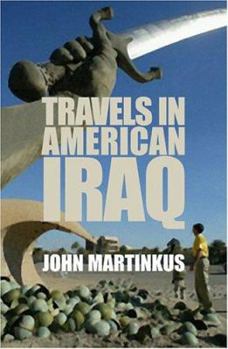Travels in American Iraq
For this riveting portrait of a city on the brink of civil war, one of Australia's most intrepid journalists spent eight weeks in and around Baghdad. Here, he takes readers into the heart of the... This description may be from another edition of this product.
Format:Paperback
Language:English
ISBN:1863952853
ISBN13:9781863952859
Release Date:January 2004
Publisher:Black (Aus)
Length:202 Pages
Weight:0.50 lbs.
Dimensions:0.7" x 5.3" x 7.8"
Customer Reviews
1 rating
Impartial Journeys In a Very Dangerous Land
Published by Thriftbooks.com User , 19 years ago
Earlier this year Australian freelance photojournalist John Martinkus spent seven weeks travelling Iraq. He goes beyond the supposedly safe Green Zone in central Baghdad, driving from one trouble spot to another accompanied by his ex-Iraqi Air Force translator. He isn't embedded with anyone. Now this journey would be suicidal. Then it was just dangerous beyond belief. The prologue of the book opens with him in the midst of gore of the second March 2004 Karbala Bombing. Martinkus had been only 100 meters away when it went off. Returning to Baghdad that night, his exhausted shock only just deadens the horror of flicking out with his pen the pieces of brain and flesh stuck in the soles of his boots. Outside of the now notorious Abu Ghraib prison, he spoke freely to the crowds of men and woman who had family members detained inside. He melted away moments before been detained by US soldiers. A week later Coalition troops would rip apart a similar crowd with heavy machine gun fire. Martinkus journeys from Baghdad down to Basra by train. The train station in Baghdad is intact, built by the British as the last stop for the Orient Express. They are the only passengers on the train. It is supposed to be safe because insurgents know there is nothing on it to steal. In Basra he meets a supporter of the now renegade Shiite cleric Moqutada al-Sadr. A man whose brother drowned on a refugee boat, which sunk between Indonesia and Australia in October 2001, drowning 349 Iraqis, confronts him. John Howard disavowed any responsibility for the disaster. "I recall thinking, `Great, now I am going to be killed thanks to Howard's asylum seeker policy." Any illusions that Iraq is peacefully moving towards democracy are dispelled. Rather then resorting to heavy-handed ideology, he proves this with interwoven vignettes of eyewitness accounts, and interviews representing a diverse range of opinions. Martinkus's book is important because just as we start to become jaded about Iraq, it reminds as of the story we will never get just by watching the evening news.






